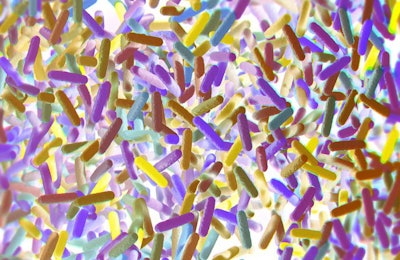
Our pets, like ourselves, are shaped by bacteria. This collection of trillions of bacteria, known as the microbiome, has a tremendous influence on health and wellbeing in both good and bad ways that science is just beginning to understand.
The microbiome living in our gastrointestinal (GI) tract and on our skin plays many vitally important roles and can cause equally important problems when things become imbalanced. One of the main benefits of microbiome research is that we are now seeing new and exciting approaches to many health problems connected to this imbalance, called dysbiosis.
Our pets have their own microbiome as well, and like us it plays just as important a role in their health and wellbeing. Recent studies on the gut microbiome of dogs show such similarities that we could be considered “cousins” from a gut bacterial perspective, and this raises an important point: Increasingly our pets suffer from the same problems as we do, whether it’s diseases associated with aging or weight control or allergies.
As we learn more about the human microbiome, these same insights can apply to solving similar problems in our pets. While research into the companion animal microbiome is lagging human studies, there are exciting advancements in humans that could benefit our pets. Specifically, the microbiome can play a key role in metabolic diseases like diabetes and in immune function leading to food allergies, and can even impact the newly discovered “gut-brain axis.”
Obesity and diabetes
A leading area of microbiome research is looking at metabolic problems like obesity and diabetes — major medical problems for people and increasingly for our pets. Through careful study of the gut microbiome in humans, we are beginning to uncover links between the bacteria in the GI tract and metabolic diseases like type 2 diabetes.
It is now believed that a type of dysbiosis or imbalance of gut microbial populations can lead to, or at least increase the odds of, diabetes. This imbalance is certainly affected by diet, exercise and many other factors, but the findings have also led to speculation that those with diabetes may benefit from the addition of specific beneficial bacteria that help to reverse the imbalance of the gut microbiome.
The news for our companion animals is very encouraging as preliminary studies have already demonstrated that dogs with type 2 diabetes present many of the same microbiome shifts as humans. As we learn more about the impact of the gut microbiome on this disease in dogs, it could lead to new ways to support dogs with diabetes that work in conjunction with the gut microbiome and improve the lives of our pets.
Food allergies
Another interesting and recent area of research is that concerning the influence of our gut microbiome on the development and control of food allergies. Food allergies affect us and our pets alike and can often be troubling and frustrating problems to deal with. Recent studies have demonstrated that once again a dysbiosis in the gut microbiome can be responsible for the development of food allergies, and that supplementation of the right bacteria can return the gut microbiome to normal, reduce the immune system’s reaction to certain foods and alleviate food allergies.
We have a long way to go to fully understand how to intervene in humans, let alone our pets, but progress is being made quickly. A new approach to dealing with food allergies in our companions, one that works with the gut microbiome, would certainly be welcome to those with pets suffering from food allergies.
Gut-brain axis
Finally, a very exciting but unexpected finding from microbiome research is something called the “gut-brain axis.” It is being shown that the bacteria in our gut are “talking” to the brain through the chemical signals produced in the gut and detected by the nervous system. Surprisingly, researchers are finding that certain bacteria in the gut microbiome influence things like depression, anxiety and social behavior.
Once again, a dysbiosis or imbalance of the gut microbiome may be a contributory factor, and there is ongoing research in human studies to understand if changing the gut dysbiosis in specific ways has an impact on the gut-brain axis. While these types of microbiome studies have not been conducted in dogs and cats, the existing human research certainly points to an interesting new way to work with our pets’ microbiome in order to influence the gut-brain axis in a way that could impact such troubling problems as separation anxiety.
Full of promise
Research into the microbiome is exciting and full of promise. Human microbiome understanding is leaping ahead, offering many interesting insights into a variety of problems, including metabolic diseases, immunity and allergies, and the gut-brain axis. The idea that a microbiome can suffer from dysbiosis or imbalance, and that the balance can be restored is an important one with important implications. These same insights can be leveraged when looking for new microbiome solutions for our pets as well. As research efforts into companion animal microbiomes accelerate, no doubt our pets will benefit from new approaches to important problems.
Dr. Scott Carter is an animal health and nutrition expert with 20 years’ experience in research and development. He is also the chief scientific officer at Anizome LLC, a company founded in 2018 with a combination of microbiome expertise, industry knowledge and commercial experience that has enabled the company to establish a world-class animal microbiome platform that bridges the gap between research and commercial solutions.















